You are right but for same technology if you add thickness you extend lifespan (as doublethick Shapton500 or King last twice as the standart one).2. A soft stone can be thicker than harder stone and still wear out faster, so bonding is key for any stone.
You are using an out of date browser. It may not display this or other websites correctly.
You should upgrade or use an alternative browser.
You should upgrade or use an alternative browser.
Diamond stones
- Thread starter Bolek
- Start date

Help Support Kitchen Knife Forums:
This site may earn a commission from merchant affiliate
links, including eBay, Amazon, and others.
Deadboxhero
Well-Known Member
- Joined
- Jul 27, 2016
- Messages
- 128
- Reaction score
- 363
You are right but for same technology if you add thickness you extend lifespan (as doublethick Shapton500 or King last twice as the standart one).
Nah you misunderstand, there is variation between different manufacturers and stones with the same bonding technology. You can have a Vitrified bond on the softer side and one that's on the harder side and everything in between.
So saying "Vitrified bond" is not universal. Some will wear slower some faster.
So just because one is 5mm and one is 3mm it's not a guarantee that the thicker stone lasts longer.
Deadboxhero
Well-Known Member
- Joined
- Jul 27, 2016
- Messages
- 128
- Reaction score
- 363
Thread needs some stone pics
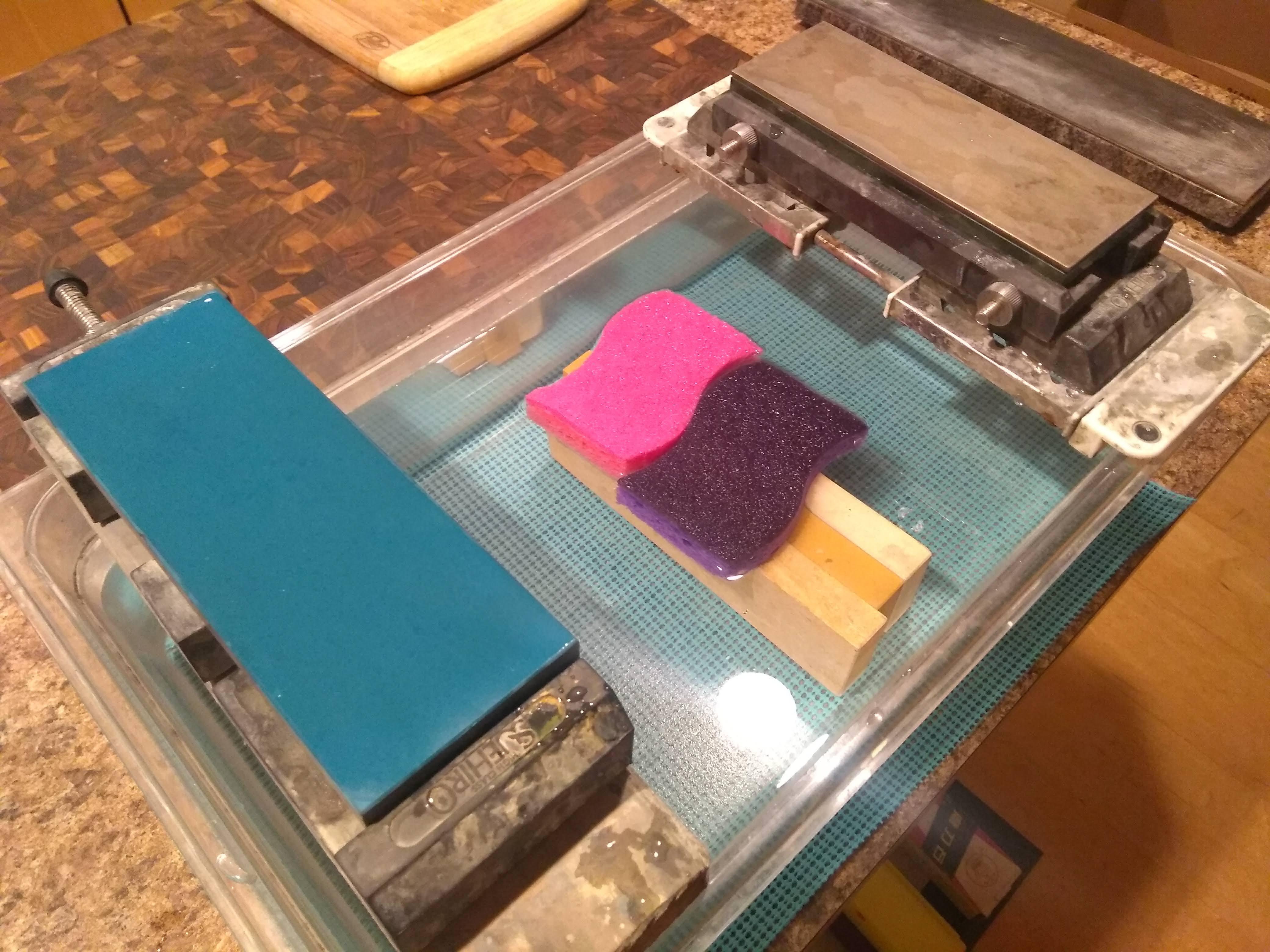
Left base Naniwa Diamond Resin 3k, right base Poltava Metallic bonded 1k
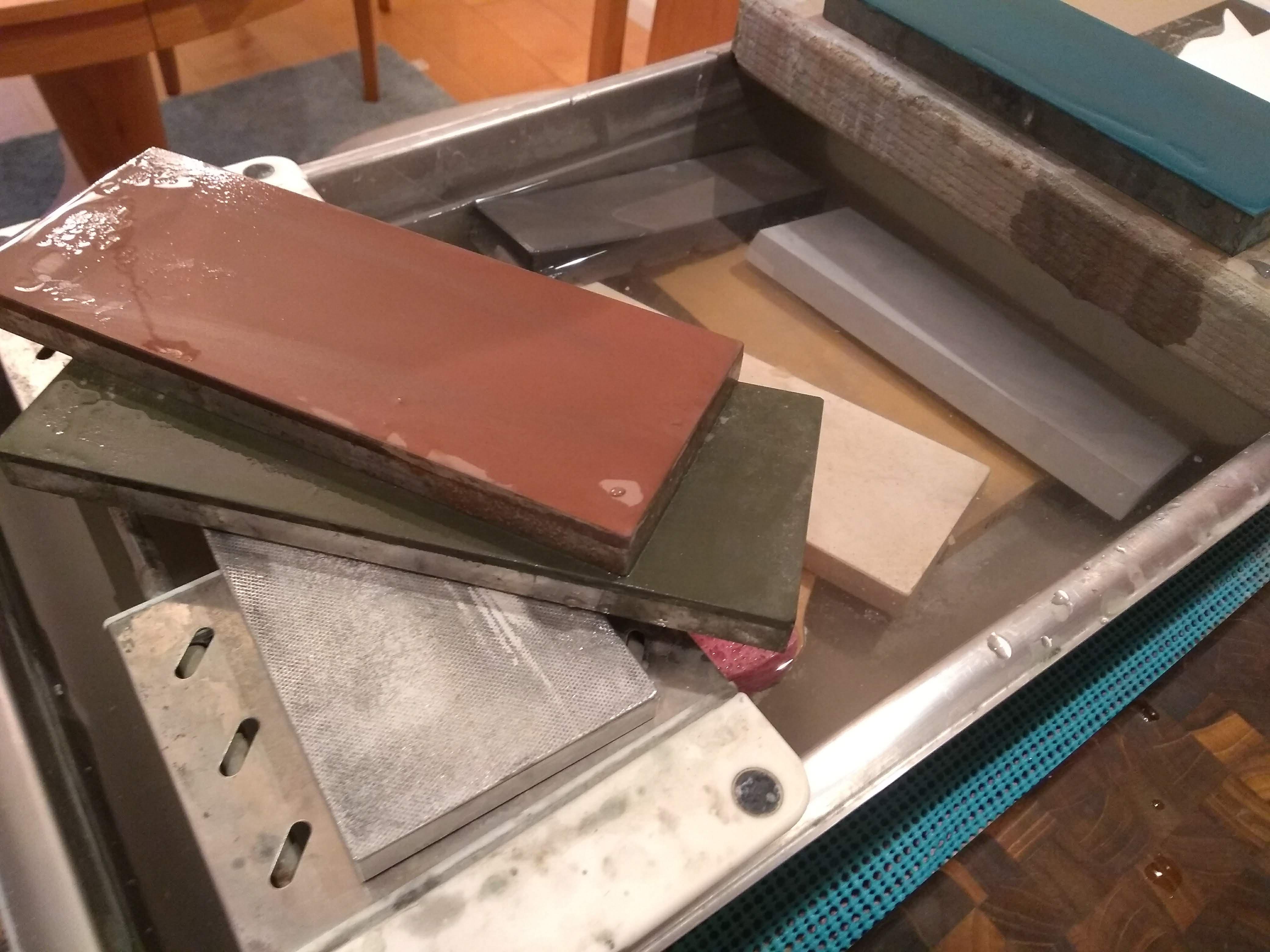
CBN resin 400 and 1500
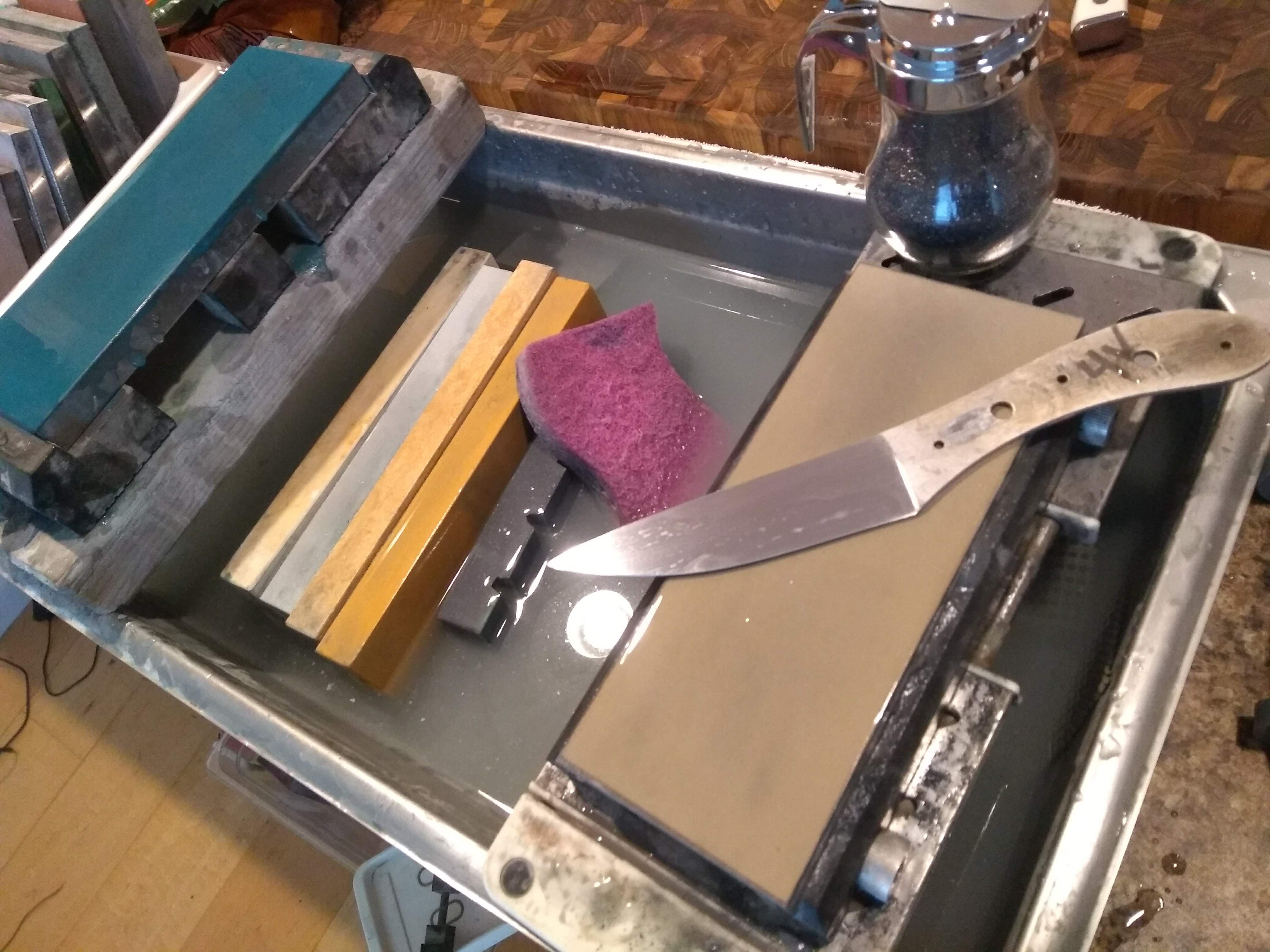
Vitrified CBN 1k
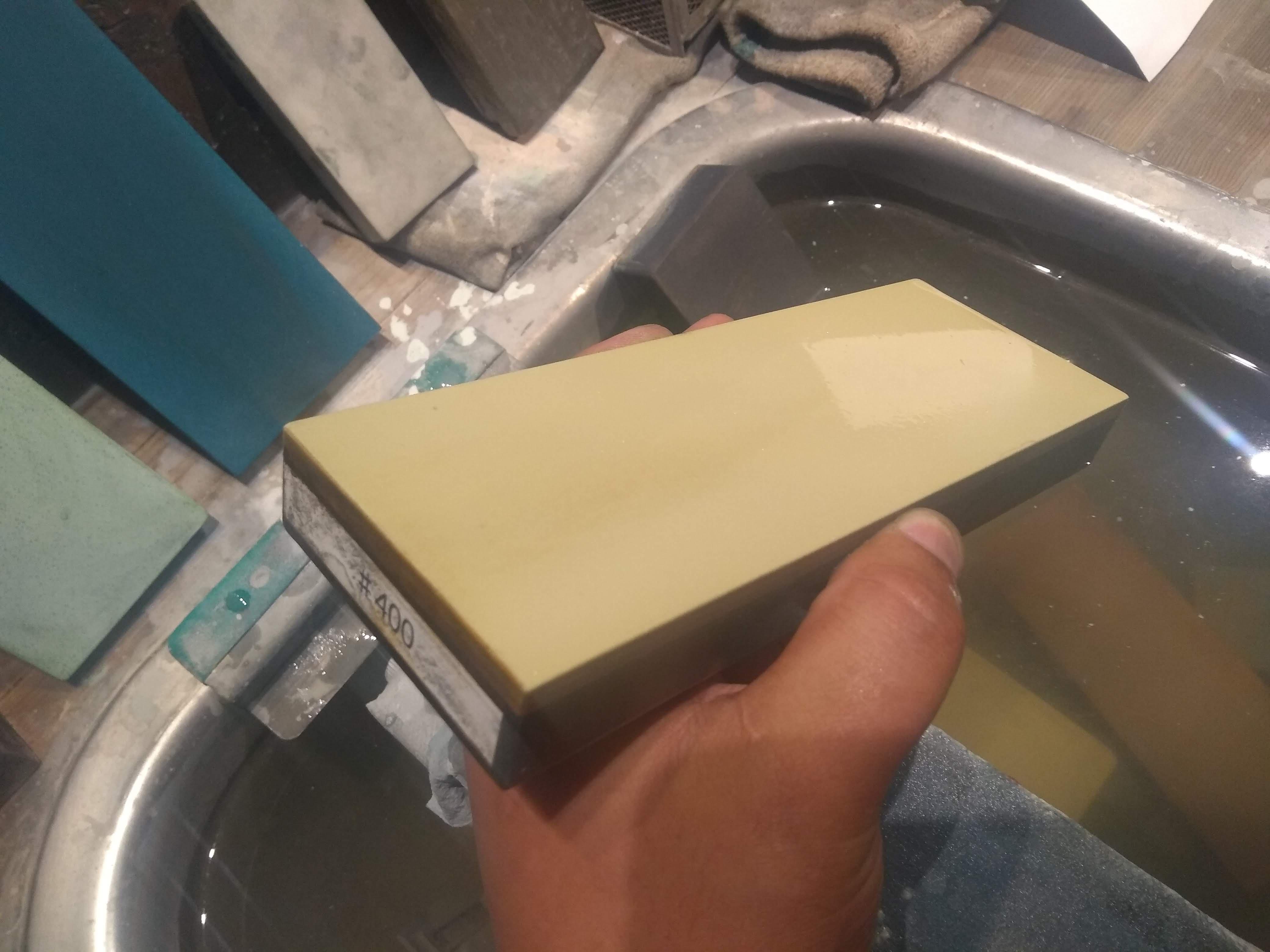
Super Vitrified Diamond 400 grit
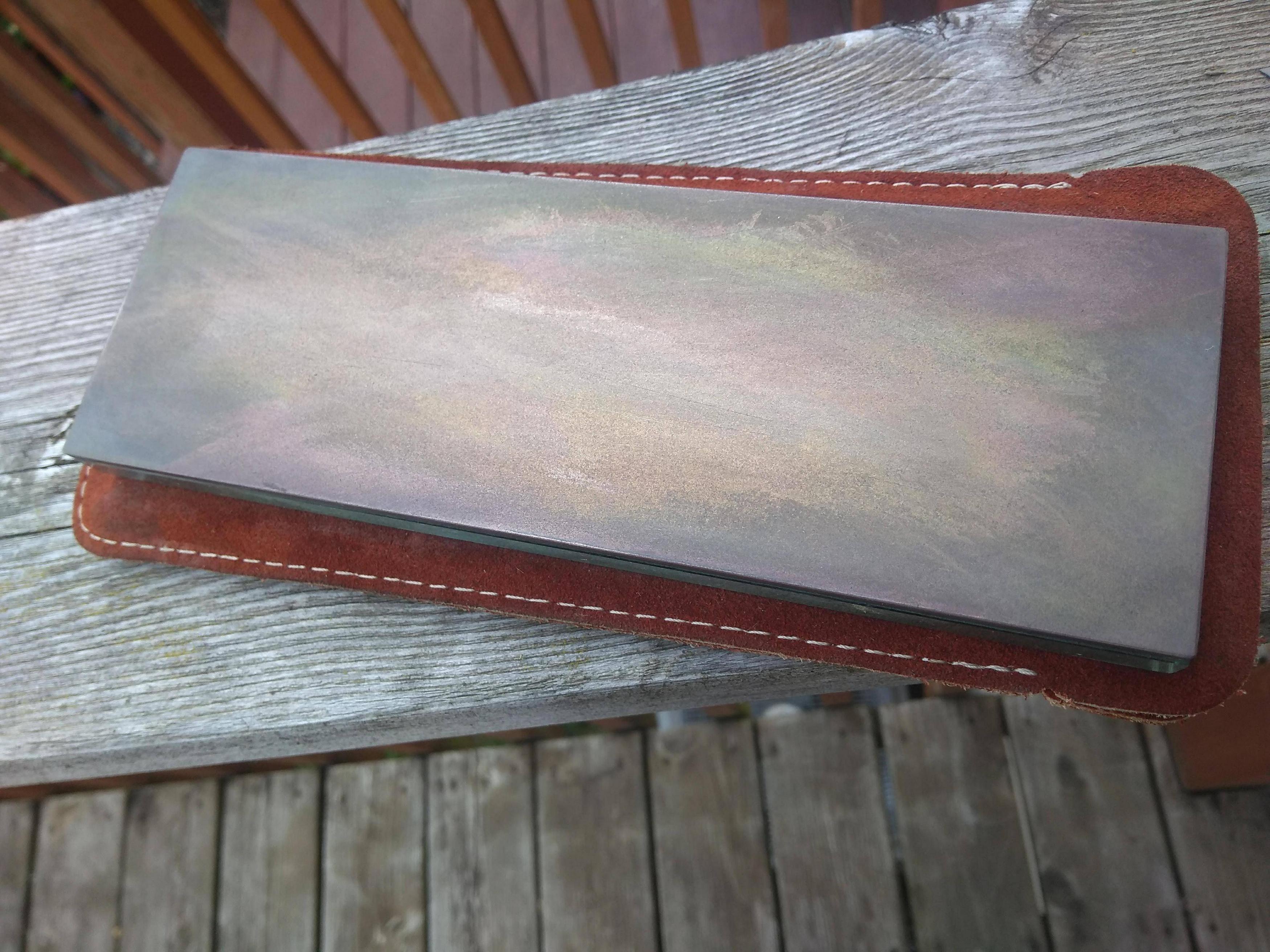
Metallic bonded 1k

Left base Naniwa Diamond Resin 3k, right base Poltava Metallic bonded 1k

CBN resin 400 and 1500

Vitrified CBN 1k

Super Vitrified Diamond 400 grit

Metallic bonded 1k
Last edited:
Thank you for sharing.Thread needs some stone pics

Left base Naniwa Diamond Resin 3k, right base Poltava Metallic bonded 1k

CBN resin 400 and 1500

Vitrified CBN 1k

Super Vitrified Diamond 400 grit

Metallic bonded 1k
You have a large variety of diamond / CBN stones. Some overlapping. Can you tell us more? Wear, dishing and abrasive layer thickness? Prices? Speed on hard steel? The knife edge you get with? Feedback? Other comments? What do you use them for?
Thank you for sharing.
You have a large variety of diamond / CBN stones. Some overlapping. Can you tell us more? Wear, dishing and abrasive layer thickness? Prices? Speed on hard steel? The knife edge you get with? Feedback? Other comments? What do you use them for?[/URL]
Shawn's (Deadboxhero) YouTube channel is chock full of awesome information. I know he has videos discussing various diamond water stones: Big Brown Bear
I remember a few years ago watching one of his reviews on them. This was when he was just doing sharpening and he commented on that they are effective but expensive. Fast forward and he's way down the high-alloy rabbit hole and selling his own "expensive" stones.
Let's clear a few things out. First of all everything wears out. Unfortunately, Shirley Bassey was wrong, diamonds are not forever. Why does the coarse stones wears out the fastest? It applies to any bond type and any type of abrasive we tipically use in sharpening. Vit is not any different. It is just another type of bond. Sharpening in general is a very agressive and brutal act of steel removal. So yes, some of the abrasive particles will be ripped out of the matrix. Diamonds will fracture. You would be surprised how easy it fractures. When people think of diamond they think well...diamond is diamond. There is a huge range of diamond grades categorised by purity, shape, fracture rate, coating etc. Some are more suited for resin others are more suited for other type of bonds but they can be interchanged to get some specific results needed for specific task. As Shawn mentioned before vit bond can be anywhere from crayon soft to a really hard. Question is, where do you want it to be and why? That was probably the most difficult question for me. Hard matrix will stay flat longer. Softer matrix will have a nicer tactile feedback. It's not going to be gesshin type of nice of course, but it will be pretty nice. Something you are not going to get from any other type of bond. Softer bond is easier to lapp and maintain. For me personaly softer bond is the winner. But thats me. I have my own taste for things. I'm trading some of the wear resistance for some extra feedback. Some people just want a stone that has minimal maintenance required. If you are a pro you don't want to spend unnecessary time on lapping. Time is money. In this case you can trade some of the feedback to maximum wear resistance. Which technically is the way it should be.Do you know how the vitrified diamond stones dish? Is it the same explanation for under 400, 400 to 3000 and above 3000 grit stones? Is the pressure on the knife relevant (for the same amount of steel removed)? Is it drop out of diamonds? Does diamonds brakes? Does diamond wear out (I do not thinks so but I am not a specialist)? BTW incising the thickness of the diamond layer (from 3mm to 5mm) is the way to go. Would further increase of the thickness be very expensive? Thank you for making all this experiments for us.
Now. If you are just a regular sharpening geek vit stones will last you a very long time. Even if it is on the softer side. Purely because it is so fast cutting. So no worries here. Let's talk about the price here. Yes, they are expensive. It is the most expensive type of abrasive. The grade of diamonds, volume of it and the bond itself. The vitrification temperatures are close to the themperatures of the diamond oxidation. It takes an insane amount of abrasive to make a standard 3x8 size plate. Also there are many other technicalities that makes it problematic to produce. Depending on the composition of the matrix it tends to change its geometry upon cooling. It can twist or go out of square. Basically you have to mold it oversized and surface grind to size. How are you going to surface grind it? With what? Very inefficient. Everything adds up. I always encourage people to see value in things. And I believe it has a great value.
I am so excited. Up to now my diamond stones was reserved for hard carbide steel knives. With a little bit over 6mm I can use it for all SS.
I am curious what the thickness of the 6k stone is.
For carbon knives the JNat is my way to go.
I am curious what the thickness of the 6k stone is.
For carbon knives the JNat is my way to go.
Jovidah
I'll make you a sponsor offer you can't refuse...
Purely out of curiosity and maybe a silly question... but how do you flatten diamond stones? Can you just rub them with an Atoma? I know they have a reputation for wearing down extremely slowly but I can imagine that eventually you get some kind of height difference.
SiC powder is your best friend here. Everything wears out. It's only a question of time. If we are talking about the really hard vit bond and you are one of those people who likes your stones perfectly flat, you have to keep an eye on the flatness of the stone. Don't let it dish too much otherwise it will take a lot of time to lapp it back. Give it a fast lapp with a soft Sic stone every now and then. But it must be very soft otherwise it will glaze over and do nothing. Sometimes you can find those oldscool double sided SiC stones in your local hardware store. They cost next to nothing. Never use the electroplated stones for that. You will kill it in a matter of minutes. Basically you are rubbing diamond against diamond and what happens is all the sharp edges polishes out. It looses all the cutting power.
This 

Sanwa kenma 1000 not sure if vitrified or not? Love this stone, if a new edge needs to be cut this will produce a very fine burr in just a few minutes work.


Where is this to be found?
i used to use the 500 grit version, but have since moved on. I prefer these to naniwa though. Solid options. The coarse one had been a recommendation of a sharpener in sakai almost a decade ago.Sanwa kenma 1000 not sure if vitrified or not? Love this stone, if a new edge needs to be cut this will produce a very fine burr in just a few minutes work. View attachment 106897
Lucky strike from a Japanese auction. Haven’t been able to find much information on it myself.Where is this to be found?
Deadboxhero
Well-Known Member
- Joined
- Jul 27, 2016
- Messages
- 128
- Reaction score
- 363
Resin StoneSanwa kenma 1000 not sure if vitrified or not? Love this stone, if a new edge needs to be cut this will produce a very fine burr in just a few minutes work. View attachment 106897
Received #2000 and #6000 from Practical Sharpening. I also asked him to give me a not good prototype diamond stone of a different grit to play with but it was not possible.
The #2000 is gorgeous and I shall learn how to use the #6000.
I do not like to sharpen a sharp knife (and dull it for that). The only not sharp knife at home yesterday was an OFTB not sharp VG10 Eden Classic suji with obtuse edge that I kept (the angle) during sharpening.
#2000 : I apply very low pressure on diamonds. With low pressure the speed is OK (it will be faster with normal pressure). No break in needed. I got the burr in 3 minutes directly on the #2000. I was not able to completely get rid of that burr on this stone. The stone is less porous and thirsty than the #400 and #6000. I do not know if the bonding is hard or soft but for a VD the feedback OK with me. Do not load, all swarf goes with the liquid (I use widows cleaner). About 6mm thick. Seems to be the sweet point for me.
#6000 With low pressure the speed is OK (it will be faster with normal pressure). Break in done directly with the knife. Get rid of the burr from #2000 on this stone. The stone is porous and thirsty. I do not know if the bonding is hard or soft but for a VD the feedback OK with me. The stone loads. About 5mm thick. As good as can be now days.
Get rid of the burr from #2000 on this stone. The stone is porous and thirsty. I do not know if the bonding is hard or soft but for a VD the feedback OK with me. The stone loads. About 5mm thick. As good as can be now days.
I am happy.
The #2000 is gorgeous and I shall learn how to use the #6000.
I do not like to sharpen a sharp knife (and dull it for that). The only not sharp knife at home yesterday was an OFTB not sharp VG10 Eden Classic suji with obtuse edge that I kept (the angle) during sharpening.
#2000 : I apply very low pressure on diamonds. With low pressure the speed is OK (it will be faster with normal pressure). No break in needed. I got the burr in 3 minutes directly on the #2000. I was not able to completely get rid of that burr on this stone. The stone is less porous and thirsty than the #400 and #6000. I do not know if the bonding is hard or soft but for a VD the feedback OK with me. Do not load, all swarf goes with the liquid (I use widows cleaner). About 6mm thick. Seems to be the sweet point for me.
#6000 With low pressure the speed is OK (it will be faster with normal pressure). Break in done directly with the knife.
I am happy.
Deadboxhero
Well-Known Member
- Joined
- Jul 27, 2016
- Messages
- 128
- Reaction score
- 363
Yea the 2k was a waste, had worse finish than the 1200. Dressing did not solve the issue either.1200 gives a pretty good mirror. 2k is not great imho. Not consistent. Can give so random deeper scratches.
- Joined
- Aug 29, 2018
- Messages
- 2,072
- Reaction score
- 4,214
@Hassanbensober
Old thread, but I also found a sanwa kenma 1K, more worn though. Compared to JKI 1k resin diamond, the sanwa is more dense and perhaps slightly harder. It is less porous of a surface compared to the JKI one, so I think it cuts slightly slower, but the sanwa cuts more fine or shallow and perhaps has better diamond consistency in grit. Reminds me a lot of nsk stones I've tried. The sanwa base is really heavy, feels like galvanized steel. I like the JKI 1k diamond more and that's more widely available by far.
Old thread, but I also found a sanwa kenma 1K, more worn though. Compared to JKI 1k resin diamond, the sanwa is more dense and perhaps slightly harder. It is less porous of a surface compared to the JKI one, so I think it cuts slightly slower, but the sanwa cuts more fine or shallow and perhaps has better diamond consistency in grit. Reminds me a lot of nsk stones I've tried. The sanwa base is really heavy, feels like galvanized steel. I like the JKI 1k diamond more and that's more widely available by far.
Chasingsharpness
Well-Known Member
I do love Vitrified diamond stones. The feel and feedback of traditional water stones with the speed and cutting power of diamonds. I would love one in the thickness of a normal stone, but most use a 3mm abrasive (granted that will still last a very long time).
I also quite like NSK resin bonded. I've only tried the 400 but others come well reviewed.
I also quite like NSK resin bonded. I've only tried the 400 but others come well reviewed.
Chasingsharpness
Well-Known Member
I believe Dr knives/HK knifeworks is also working on a 10-15mm Vitrified diamond stone at the moment.
I would love to see thicker vitrified diamond stones made. It may be overkill as these stones do not need to be as thick, but it would be nice to have the extra longevity and a little more peace of mind when eventually flattening. A thicker vitrified diamond stone would be a true stone for life.
I would love to see thicker vitrified diamond stones made. It may be overkill as these stones do not need to be as thick, but it would be nice to have the extra longevity and a little more peace of mind when eventually flattening. A thicker vitrified diamond stone would be a true stone for life.
Economic factors aside, is the thinness a response to brittleness? I’m guessing maybe the non-diamond substrate is needed to provide stability and if the diamond layer were thicker it might crack more easily.
I can't really imagine how much something like that would cost if quality diamonds with good amounts would be used. Basically same concentration and quality as in 3 mm. Even 3 mm vit diamond stones last years for normal people. I just doubt these would sell well if they were a few thousand dollars, people complain about the $400-$500 price of the 3 mm ones.I believe Dr knives/HK knifeworks is also working on a 10-15mm Vitrified diamond stone at the moment.
I would love to see thicker vitrified diamond stones made. It may be overkill as these stones do not need to be as thick, but it would be nice to have the extra longevity and a little more peace of mind when eventually flattening. A thicker vitrified diamond stone would be a true stone for life.
Chasingsharpness
Well-Known Member
That's an interesting question, I've also wondered if there any limitations or difficulties in manufacturing thicker stones or if it's just price and function. I know the FSK/BBB had a non-diamond layer between the stone and the base.Economic factors aside, is the thinness a response to brittleness? I’m guessing maybe the non-diamond substrate is needed to provide stability and if the diamond layer were thicker it might crack more easily.
I can't really imagine how much something like that would cost if quality diamonds with good amounts would be used. Basically same concentration and quality as in 3 mm. Even 3 mm vit diamond stones last years for normal people. I just doubt these would sell well if they were a few thousand dollars, people complain about the $400-$500 price of the 3 mm ones.
I'm unsure how much the Dr Knives/HKKW one will end up being, but I don't expect they will be cheap. I'm unsure how much the 5mm practical sharpening ones cost compared to the older 3mm ones.
I agree the steep price does take these stones out of consideration for most people, but many like the JKI800 or FSK/BBB sell out out very quickly. There's definitely a limit, but I hope with with increased demand and production we see more some more options or lower prices in the future.



